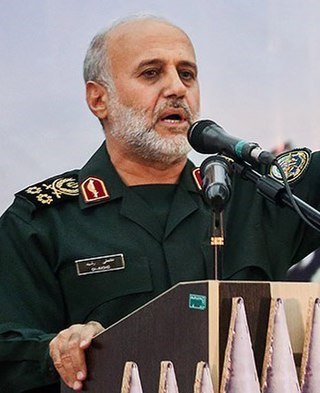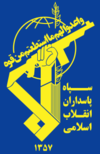
The Islamic Revolutionary Guard Corps, also called Sepah or Pasdaran, is a multi-service primary branch of the Iranian Armed Forces. It was officially established by Ruhollah Khomeini as a military branch in May 1979, in the aftermath of the Islamic Revolution. Whereas the Iranian Army protects the country's sovereignty in a traditional capacity, the IRGC's constitutional mandate is to ensure the integrity of the Islamic Republic. Most interpretations of this mandate assert that it entrusts the IRGC with preventing foreign interference in Iran, thwarting coups by the traditional military, and crushing "deviant movements" that harm the ideological legacy of the Islamic Revolution. Currently, the IRGC is designated as a terrorist organization by Bahrain, Saudi Arabia, Sweden and the United States.

Mohsen Rezaee is an Iranian conservative politician affiliated with the Resistance Front of Islamic Iran and senior military officer in the Islamic Revolutionary Guard Corps, who is currently a member of the Expediency Discernment Council, secretary of the Supreme Council for Economic Coordination, as well as the secretary of the Iranian government's Economic Committee. He was secretary of the Expediency Discernment Council from 1997 to 2021 and Vice President of Iran for Economic Affairs between 2021 and 2023.

The Navy of the Islamic Revolutionary Guard Corps is the naval warfare service of the Islamic Revolutionary Guard Corps founded in 1985, and one of the two maritime forces of Iran, parallel to the conventional Islamic Republic of Iran Navy. The IRGC has been designated as a terrorist organization by the governments of Bahrain, Saudi Arabia and the United States. IRGC's Navy has steadily improved its capabilities to support unconventional warfare and defend Iran's offshore facilities, coastlines, and islands in the Persian Gulf.

The Islamic Revolutionary Guard Corps Ground Forces, acronymed NEZSA, are the land force which the Islamic Revolutionary Guard Corps (IRGC), maintain in parallel to the regular army of Iran. In addition to their conventional military role, the revolutionary guards' ground forces are more geared towards internal disorder than the regular army. However, in late years, the IRGC Ground Forces and by extension the entire IRGC, have transitioned to becoming an expeditionary force, capable of projecting power abroad, through conventional military operations or via proxies and unconventional warfare. There are at least around 150,000 IRGC Ground Force troops.

The Iranian Armed Forces, officially the Islamic Republic of Iran Armed Forces, are the combined military forces of Iran, comprising the Islamic Republic of Iran Army (Arteš), the Islamic Revolutionary Guard Corps (Sepâh) and the Law Enforcement Force (Police).

The Ministry of Defence and Armed Forces Logistics is the defence ministry of the Islamic Republic of Iran and part of the country's executive branch. It thus reports to the President of Iran, not to the Commander-in-Chief of the Iranian Armed Forces.
Mohammad Hossein Jalali is an Iranian military official who served as minister of defense.
Mousa Refan also known as Akbar Refan, is an Iranian electrical engineer and former military officer.

This is a list of Iranian leaders of the Armed Forces of the Islamic Republic of Iran during the Iran–Iraq War (1980–88).
The Fath Medal is a military award of the Iranian armed forces which is awarded by Commander-in-chief, Supreme Leader of Iran. The medal is the likeness of three Palm leaves over Khorramshahr's grand mosque, Flag of Iran and the word "Fath".

Hossein Salami is an Iranian military officer with the rank of major general, who is the commander-in-chief of the Islamic Revolutionary Guard Corps (IRGC).

Ideological−Political Organization or Bureau of FARAJA is one of three virtually independent hierarchical systems inside Law Enforcement Force of Islamic Republic of Iran, alongside its Command system and the Intelligence Protection Organization. Director of the organization is directly appointed by the Supreme Leader of Iran. The Ideological−Political organizations of Iranian armed forces are taught to indoctrinate the personnel with Islamic and political training aligned with the Supreme Leader's guidelines. The organization is supervised by clerics.
Joint Staff of the Islamic Revolutionary Guard Corps, formerly called General Staff, was the chief of staff of the Islamic Revolutionary Guard Corps with an aim to coordinate its military branches; and responsible for organization, support, and supervision of all executive affairs within the military. The office was originally created in late 1984 General Provost of IRGC was a subdivision to the Joint Staff.

Mohammad Bagheri (Persian: محمد باقری, born Mohammad-Hossein Afshordi is an Iranian Islamic Revolutionary Guard Corps military commander serving at the most senior military position available in Iran, Chief of Staff for the Armed Forces of the Islamic Republic of Iran. He holds the rank of Major General within the Iranian military.

Major general Gholam Ali Rashid is the commander of Khatam-al Anbiya Central Headquarter and former deputy chief of the General Staff of Armed Forces of the Islamic Republic of Iran who was among decision-making commanders in the Iran–Iraq War. Also, Gholam Ali along with Mohammad Ali Ja'fari, Ali Fadavi, Qasem Soleymani, and Mohammad Bagheri is member of command network in the Armed Forces of the Islamic Republic of Iran.

The Government of the Islamic Republic of Iran is the ruling state and current political system in Iran, in power since the Islamic revolution and fall of the Pahlavi dynasty in 1979.

The position of Commander-in-Chief (Farmandehe Koll-e Qova, formerly known as Bozorg Arteshtārān is the ultimate authority of all the Armed Forces of Iran, and the highest possible military position within the Islamic Republic of Iran. The position was established during the Persian Constitutional Revolution. According to the Constitution of Iran, the position is vested in the Supreme Leader of Iran and is held since 1981.

Mohammad Bagher Zolghadr is an Iranian retired military commander in the Islamic Revolutionary Guard Corps who currently serves as the Secretary of the Expediency Discernment Council. Also he is currently member of the Expediency Discernment Council.

Mostafa Izadi is an Iranian senior military officer in the Revolutionary Guards with the rank of Major general. He is a former commander of the IRGC's Ground Force.
Second brigadier general is a senior military rank in the armed forces of Iran. The rank was introduced in 1987 as part of a new modified ranking system. Currently, there is no equivalent for the rank of second brigadier general in other countries but the rank of second brigadier general lies under the NATO equivalent code of OF-6. It is the lowest ranking general officer rank in the armed forces of Iran and lies between the ranks of colonel and brigadier general. However, the equivalent rank in the Iranian navy is the rank of Second flotilla admiral.






































